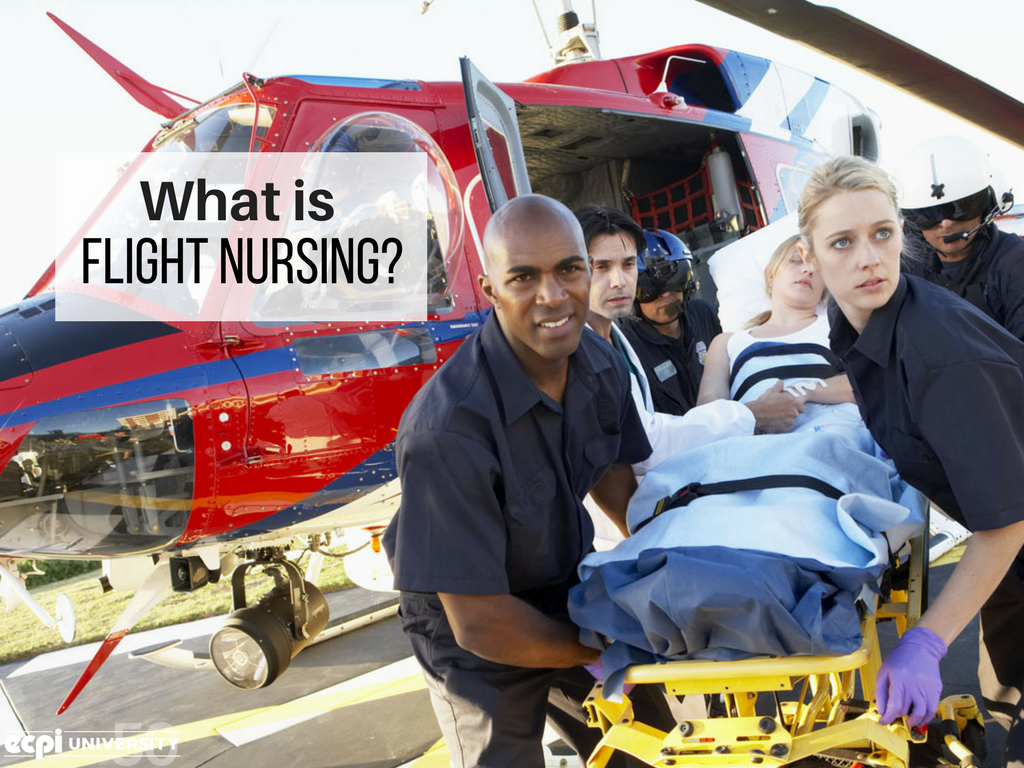What is Flight Nursing?
Being a nurse doesn't always involve working inside a healthcare facility. Accidents and medical emergencies can take place anywhere. When accidents or injuries happen in locations that are difficult to reach, or patients need to be transfered to another hospital immediately, this calls for a special kind of nurse. A flight nurse. It’s a flight nurse’s duty to administer medical aid to the patient and make sure they are taken care of until the patient reaches a hospital. Let's take a closer look at what it takes to become a flight nurse.
Educational Requirements
A flight nurse is generally part of a team of medics on board an emergency medical aircraft. The team includes flight medics, respiratory practitioners, and the option of a physician for a comprehensive emergency response.
A flight nurse can work for either civilian or military outfits. The training that goes into becoming a flight nurse is quite similar to the training that goes into becoming a registered nurse, with additional specialized training for dealing with mid-air emergencies.
In addition to being an RN, you will also need to have two to three years worth of experience in critical care and mobile intensive care. Flight nurses are also generally required to have an Advanced Cardiac Life Support certificate and a Pediatric Advanced Life Support certificate.
Additionally, there are a number of certificates you can obtain at the national level to improve your skills and qualification level for flight nursing, including Critical Care Certification (CCRN), Certified Flight Registered Nurse (CFRN) and Certified Emergency Nurse (CEN).
Duties and Responsibilities
Being a flight nurse is a demanding job with duties and responsibilities that demand the utmost care and attention. Here are just some of them.
- Planning and preparing for the aeromedical evacuation mission based on a variety of factors. These include the seriousness of the patient's medical condition, moving them from the aircraft in a manner that does not worsen their condition, and making sure you can keep them stable on the journey.
- In the absence of a flight physician, the flight nurse must initiate the emergency treatment procedure the patient needs to survive long enough to reach the hospital.
- Nurse the patient and attend to their needs while the aircraft is in flight.
- Act as the liaison between the medical crew and the operational aircrew to ensure the entire evacuation procedure is carried out as smoothly as possible while causing minimum discomfort to the patient.
- Keep the aircraft well-stocked with the appropriate medical supplies and equipment that might be needed in the event of a medical emergency, and bringing any lapses in safety to the attention of the crew so the problem can be addressed quickly.
- Be able to provide a range of specialized medical procedures in mid-air, including mechanical ventilation, chest tube insertion, trauma life support, and resuscitation.
- Providing emotional care and counseling to the patient and their relatives, and asking for as much information from them as possible that can be used to contact their relatives on the ground.
- Providing a full and detailed report on the patient's condition to the hospital where the patient is taken for treatment, and making sure the patient is taken care of before returning to active duty aboard the aircraft.
Skills and Qualities
Becoming a flight nurse will require many of the same skills involved in being an RN. But there are other qualities you will need as well. Here are just a few.
Decision Making
As a flight nurse, you might witness the patient getting sick or suffering an accident resulting in a medical emergency. It is important that you are able to face such a situation without panicking, but can quickly and calmly lay out a plan of action for attending to the emergency using the available resources.
Physical Fitness
Going up in the air for long periods of time can have adverse effects on your health, and having to attend to a medical emergency in such conditions can make matters worse. You need to be in good physical shape to be able to handle the demands of the job.
Communication
It might be literally the difference between life and death when you’re in the air with a critically ill patient. Being able to communicate clearly and effectively, with the other medical personnel in the plane, with the pilots, and with the medical staff on the ground, will be imperative to the patient getting to the hospital safely.
Psychologically Strong
As the first responder to a medical emergency, you will witness many disturbing incidents while on the job depending on the seriousness of the medical condition. You need to be able to endure such sights without allowing them to affect your mental state.
Does flight nursing sound like the right pace for you? If you’re interested in earning an Associate of Applied Science in Nursing and becoming a registered nurse, consider ECPI University for your education. To start the conversation about your future, connect with a helpful admissions representative today.
It could be the Best Decision You Ever Make!
DISCLAIMER – ECPI University makes no claim, warranty, or guarantee as to actual employability or earning potential to current, past or future students or graduates of any educational program we offer. The ECPI University website is published for informational purposes only. Every effort is made to ensure the accuracy of information contained on the ECPI.edu domain; however, no warranty of accuracy is made. No contractual rights, either expressed or implied, are created by its content.
Gainful Employment Information – Nursing (RN) - Associate’s
For more information about ECPI University or any of our programs click here: http://www.ecpi.edu/ or http://ow.ly/Ca1ya.




